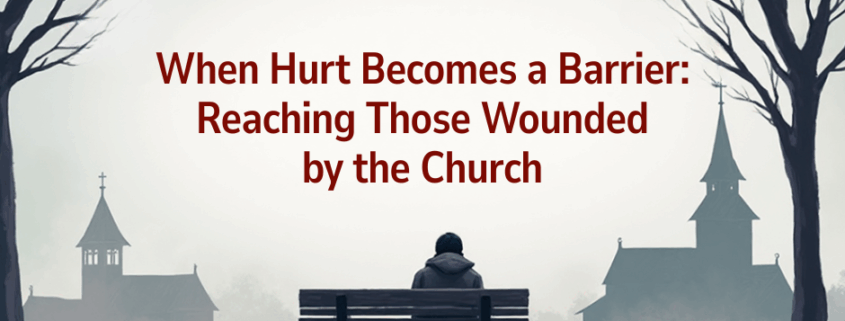When Hurt Becomes a Barrier: Reaching Those Wounded by the Church
Effective evangelism requires more than simply sharing the Gospel. It demands recognizing that every person we speak with brings a unique story. While some genuinely wrestle with Christianity’s truth claims, others aren’t seeking theological clarity at all. They simply need someone to hear why they have walked away from their faith.
For these former believers, the reasons rarely involve apologetics or science. Instead, they carry wounds inflicted by Christians themselves. These scars are deeply personal and derive from harsh judgment, hypocrisy, spiritual abuse, or the quiet ache of feeling invisible in communities that preached unconditional love. These aren’t abstract objections but rather deeply personal hurts that shape how they see Jesus, the church, and whether faith could ever feel safe again.
This reality reminds us that it is profoundly difficult to separate personalities from doctrines. Some people don’t remain committed to convictions when others holding the same beliefs behave badly. When someone has been genuinely hurt by the church, our carefully prepared arguments and apologetics often fall flat. Logic cannot heal a broken heart.
Here are some simple ways to connect with those hurting and broken from experiences with those who claim to be Christian.
Start with Listening, Not Defending – When someone shares their painful story, resist the urge to explain, justify, or defend the faith immediately. Their hurt is real, even if their theology became confused in the process. Create space for them to be heard without judgment. Sometimes the most evangelistic thing we can do is simply validate someone’s pain, share how sorry we are and how Jesus hurts with them.
Acknowledge the Church’s Failures – We don’t need to defend every Christian who’s ever behaved poorly. Jesus himself reserved his harshest words for religious leaders who burdened others. It’s okay to say, “That shouldn’t have happened to you. I’m sorry you experienced that in a place that should have shown you love.” Churches are made up of broken believers and sometimes they do terrible things to one another. That does not change God’s love for us.
Embody the Difference – The most powerful apologetic for a watching world is Christians who actually look like Jesus. Be gracious and humble showing patience and genuine love. Your consistent, authentic faith over time can begin to separate the beauty of Christ from the ugliness that was experienced. These people are not looking for perfect Christians just honest ones that appreciate their perspective. When we live authentically as followers of Jesus, we give more credibility to the message we proclaim.
Point Beyond Ourselves – Our goal is always to share the love and grace that Jesus offers. We should gently remind them that Christianity isn’t about following imperfect people but is about trusting a perfect Savior. A Savior who can also relate to being wounded by people claiming religious authority. Jesus understands betrayal, abandonment, and hypocrisy because he suffered all these things himself.
These are not easy conversations. Don’t expect everything to be forgotten or become ok through one conversation. We must meet these doubters where they hurt. We must show patience, humility, and a willingness to let our care for their souls be louder than our arguments. Our transformed lives become the most compelling reason for others to reconsider faith. We need to be the living demonstration that following Jesus changes everything. Remember that sometimes the path back to faith must first wind through seasons of healing and grace.


Leave a Reply
Want to join the discussion?Feel free to contribute!